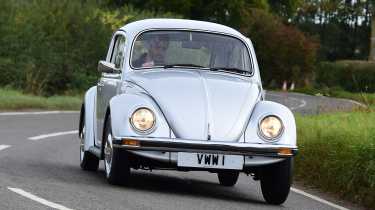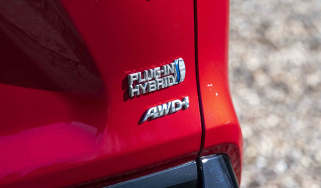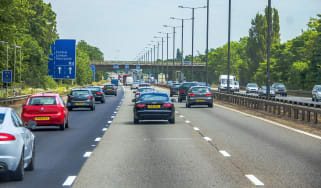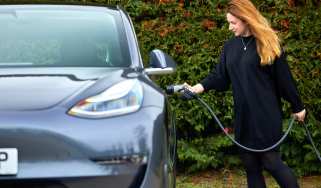Classic car tax exemption: which historic vehicles qualify?
Here’s what you need to know about the UK’s 40-year classic car tax exemption

Running a classic car is rarely a cheap hobby, but you could save a heap of cash if your car qualifies for the historic vehicle tax exemption. Not every classic car is eligible and there are some hoops to jump through to register a car as historic, but we’ll explain everything in detail in this guide.
It’s also worth noting that if your car is registered as a historic vehicle, it’s exempt from London’s ULEZ charge – but not the congestion charge. You’re also not required to take your historic vehicle for an annual MoT test, although it must be in a roadworthy condition to drive on the public road or else you could face a hefty penalty fine. Some owners continue to take their vehicle for an annual MoT, even when they are exempt as it can highlight areas of concern that they may otherwise be unaware of.
For a complete guide to road tax, you can read our full VED (Vehicle Excise Duty) explainer here.
Which cars qualify for the classic car tax exemption?
For a classic car to qualify for historic vehicle tax exemption, it must be over 40 years old. It’s a rolling exemption, so the 40 year cut off moves forward by one year, every year. But it’s a little more confusing in practice, as the exemption only starts from the beginning of the financial year.
For example, if your car was first registered in October 1984, it would turn 40 years old in October 2024. However, its tax exemption would begin from the start of the next financial year – April 1st 2025. You will need to tax the car as normal up until this point. By April 1st 2026, any car registered before January 1st 1986 will be eligible, and so on.
The exemption applies to cars, vans, motorcycles and tricycles, as well as some HGVs and buses. However, any vehicle that is used for hire or reward – i.e., any vehicle being used as a taxi – or any vehicle being used for commercial purposes, doesn’t qualify for the exemption.
My car is over 40 years old, is it automatically tax-free?
If your car is over 40 years old and it’s not being used for commercial purposes, then it qualifies for the exemption, but the tax-free registration doesn’t apply automatically. First, you must register your car as a historic vehicle, which requires a bit of paperwork.

Fortunately, it isn’t too difficult to sort out. If you are buying a car that qualifies for the exemption, then make sure to ask the owner if they have already completed the exemption forms. This is especially true of ‘barn find’ cars that may have been unused for an extended period. You should check the V5C registration document and see if the vehicle is classed as ‘historic’.
How do I declare my classic vehicle as tax exempt?
If your car has just turned 40 years old, you’ll need to register it as a historic vehicle. To do this, you’ll need the V5C registration document. You simply need to fill in section 7 and change the vehicle class from PLG (Private Light Goods) to Historic.
You must then visit your local post office, bringing your valid MoT certificate (or proof of MoT exemption) and a completed V10 tax request form. The post office will check everything over for you before processing your request, after which you’ll receive a new logbook in the post. This is a free service and if your car is currently taxed, you will be issued a refund for the remaining months.
You’re currently not able to apply for historic vehicle tax exemption online.
If, however, the car was built more than 40 years ago, but was for some reason first registered in later years due to importation or sitting around in a dealership for a few months, the process of applying for historic vehicle status is slightly more arduous. In these cases, you must prove to the DVLA the build date, which can usually be done with an original build sheet from the manufacturer – or with help from the myriad owners’ clubs.
It’s also worth keeping in mind that there may be a cost associated with this, and you should weigh this up against the cost of the car’s VED. In most cases, it’s more cost effective to find proof of the build date. Remember that a vehicle only becomes VED exempt as of the beginning of the financial year, on April 1st.
Will I still have to complete a V11D for my classic car?
In order to drive your classic car on the road, you still need to go through the process of taxing your car, despite the fact you won’t have to pay anything. As with any other vehicle, the owner of a classic car will receive an annual V11D road tax reminder in the post so that the owner can confirm whether it’s roadworthy and in use, or SORN (off the road). This will need to be completed online, over the phone or at your local post office.
Why don’t classic vehicles have to pay road tax?
In most cases, classic cars are owned as a second car, driven only when the sun is shining or on weekends and holidays. Exemption may seem unfair but if they were to be taxed like new cars, it could raise the cost of ownership to the point where only the very wealthy could afford them.
According to the Federation of British Historic Vehicle Clubs (FBHVC), which is as close to an historic vehicle governing body as we have, the classic car industry in the UK is said to be worth around £4bn per year to the economy. That’s why, thanks in part to the campaigning by the FBHVC, the rolling exemption has been reinstated.
The UK had a 25-year rolling tax exemption in place for classic vehicles in the past but this was abolished in 1997 by the incoming Labour government. In the intervening years the 1972 cut-off for the classic car tax exemption remained in place, until 2014 when plans were announced to reintroduce the rolling 40-year exemption. During the 2015 budget, these plans were confirmed, to the joy of many enthusiasts.
How long can this tax exemption last?
In 2014, the Government brought in the rolling tax exemption scheme. However, there’s no guarantee that this won’t change in the coming years – it has done in the past. All the signs point to this becoming a permanent fixture though, which should be great news for owners of early-1980s ‘modern classics’, who can look forward to tax-free motoring in the coming years.
Recently there has been pressure and campaigns to drop the age of the exemption to vehicles that are 30-years old. The government responded by denying the need to make any changes, claiming it believed the 40-year exemption for road tax and annual MoT struck the right balance.
Historic status for classic vehicles will also protect drivers in the future. For example, historic vehicles are exempt from the London Ultra Low Emission Zone (ULEZ) which, ironically, was originally introduced to prevent older, more polluting vehicles from being used in the capital.
Frequently Asked Questions
No, the 25-year rule was abolished in 1997. Today, a vehicle must be at least 40 years old to qualify for a classic car tax exemption.
Planning to store your classic car off the road? Find out everything you need to know about SORN (Statutory Off Road Notification)...
More on UK car tax...
Recommended

Petrol and diesel car ban relaxed with hybrids permitted beyond 2030
Most Popular
Tips & advice

Car dashboard warning lights: what does each symbol mean?

Electric car charging stations: public networks, charger types, apps and maps








